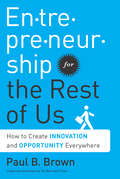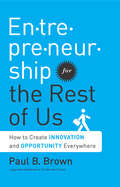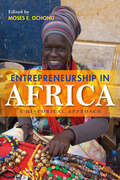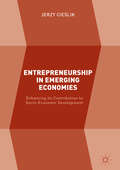- Table View
- List View
Entrepreneurship for Engineers
by Kenji UchinoEntrepreneurs have led economies out of downturns in the last 100 years and evidence points to this trend continuing into the future. In fact, regardless of country or economic conditions, entrepreneurial enterprises are on the rise. High-tech start-ups, where innovation, dedication, collaboration, and pure genius align into a successful enterprise
Entrepreneurship for Everyone: A Student Textbook
by Noha Mellor Anne Chick Antonia Bifulco Alan Fisher Robert Mellor Gary Coulton′Innovative, well organised, readable and authoritative. This is a text that takes a modern and refreshing approach to a subject that is an essential ingredient on today′s economic agenda′ - Graham Beaver, Professor of Strategic Management, Visiting Professor to Queensland University of Technology, Fellow of the University of Warwick Not everyone who wants to study entrepreneurship has a theoretical background in business. Specifically written for students who do not have a strong business theory background, the authors of Entrepreneurship for Everyone bring alive the crucial issues for understanding this dynamic field. Going beyond the traditional textbook, the authors equip students with the necessary business knowledge and essential practical advice on applying that knowledge in the real world, to a range of types of industry - from sustainable industries, information technology, healthcare, biotechnology, as well as the musical and creative industries. Key entrepreneurship concepts that are covered include: - the theories and tools of creative thinking - market research - intellectual property protection - relevant economics If you are coming to this area anew, and especially if you are interested in how entrepreneurship is applied, putting this text back on the shelf could cost you real success.
Entrepreneurship for Rural Start-ups: Lessons and Guidance for New Venture Creation (Routledge Focus on Business and Management)
by Gloria Jiménez-Marín; Alejandro López Rodríguez; Miguel Torres García; José Guadix MartínEntrepreneurs who start out with no network, no money, no market and scarce resources find a big contrast between what they read in books and the success stories from the Valley and their reality, specially first-timers. Most entrepreneurial books focus on the Business Canvas Model, simplifying the process of building a start-up. Many entrepreneurs who have no previous business experience embrace quick and lean methods without the foundations needed to build solid value proposals. This book stands out because it deals with entrepreneurship in environments far removed from large cities with fewer infrastructures, connections and resources but which also need companies that provide services to citizens and society. This book focuses on the basics, treating each part of the business canvas as a discipline itself that must be mastered. The book illustrates key lessons learned and offers guidance on essential topics for new venture success in mainstream markets. It expands critical lessons learned and points of guidance across several key topics for new venture creation. Noteworthy is the role of context, financial understanding, building business development skills and start-up communications. Entrepreneurship for Rural Start-ups will be of interest to students, academics and researchers in the field of entrepreneurship, and will be of use to individuals looking to start a local business to take advantage of the rural environment and the possibilities it offers.
Entrepreneurship for the Creative and Cultural Industries
by Bonita KolbArtists, musicians, actors, singers, designers and other creative individuals need to understand basic business concepts if they are to successfully pursue their chosen artistic profession. These skills have historically not been taught to creative students, which leaves them unprepared to make a living from their artistic efforts. Entrepreneurship for the Creative and Cultural Industries will teach the basics of business in a way that is relevant to the challenges of running a small business marketing a creative product. Whether it is understanding the basics of business language, appreciating the crucial importance of finance, or using social media marketing, this innovative textbook covers the entrepreneurial skills required to succeed in the creative sector. Including advice from artists who have turned their idea in to a profitable business and worksheets that can be combined into a simple business plan, Kolb helps non-business minded creatives to understand everything they need to succeed in the increasingly competitive creative economy. This textbook is essential reading for non-business students who are looking to understand the business side of the creative sector whilst its practical style will also suit recent graduates in these industries
Entrepreneurship for the Creative and Cultural Industries (Mastering Management in the Creative and Cultural Industries)
by Bonita KolbArtists, musicians, actors, singers, designers and other creative individuals need to understand basic business concepts if they are to successfully pursue their chosen artistic profession. These skills have historically not been taught to creative students, which leaves them unprepared to make a living from their artistic efforts. Entrepreneurship for the Creative and Cultural Industries will teach the basics of business in a way that is relevant to the challenges of running a small business marketing a creative product. Whether it is understanding the basics of business language, appreciating the crucial importance of finance, or using social media marketing, this innovative textbook covers the entrepreneurial skills required to succeed in the creative sector. Including advice from artists who have turned their idea into a profitable business and worksheets that can be combined into a simple business plan, Kolb helps non-business-minded creatives to understand everything they need to succeed in the increasingly competitive creative economy. This textbook is essential reading for non-business students who are looking to understand the business side of the creative sector, while its practical style will also suit recent graduates in these industries.
Entrepreneurship for the Rest of Us: How to Create Innovation and Opportunity Everywhere
by Paul B. BrownToday when the competition, technology, and the economy are evolving faster than ever before, organizations and the people like us who work in them need a proven approach to help us adapt--and succeed. The key, according to Paul B. Brown, is to think like an entrepreneur, no matter what your position or industry.What works for the most successful entrepreneurs will work for us, Brown argues, whether we want to stay employed working for someone else or are thinking of going off on our own. Based on extensive research, Entrepreneurship for the Rest of Us reveals the best practices of the most successful entrepreneurs, those who are adept at continually innovating and seeing opportunity where others do not. In short, the entrepreneurial mindset is a protection against economic uncertainty, and Brown's goal is to spread that thinking to individuals and large organizations alike.Though of course we won't all start or run our own companies, we need to learn to think like entrepreneurs so that when uncertainty hits, as it will again and again, individuals and companies will be better prepared to not only survive but win.
Entrepreneurship for the Rest of Us: How to Create Innovation and Opportunity Everywhere
by Paul B. BrownToday when the competition, technology, and the economy are evolving faster than ever before, organizations and the people like us who work in them need a proven approach to help us adapt--and succeed. The key, according to Paul B. Brown, is to think like an entrepreneur, no matter what your position or industry. What works for the most successful entrepreneurs will work for us, Brown argues, whether we want to stay employed working for someone else or are thinking of going off on our own. Based on extensive research, Entrepreneurship for the Rest of Us reveals the best practices of the most successful entrepreneurs, those who are adept at continually innovating and seeing opportunity where others do not. They do that by following a rigid approach. For example: They never start with a new idea, but by trying to solve a market need. Financing is an afterthought. They get started with the resources at hand (not only does that allow them to move quickly, if things don't work out, they are not out much). Perfect is the enemy of good, it is much more important to get out into the marketplace with a prototype than to keep fiddling with what you have. In short, the entrepreneurial mindset is a protection against economic uncertainty, and Brown's goal is to spread that thinking to individuals and large organizations alike. Though of course we won't all start or run our own companies, we need to learn to think like entrepreneurs so that when uncertainty hits, as it will again and again, individuals and companies will be better prepared to not only survive but win.
Entrepreneurship from Creativity to Innovation: Effective Thinking Skills for a Changing World
by Martin Binks Edward LumsdaineEntrepreneurship: From Creativity to Innovation is a unique guide for students, potential entrepreneurs and inventors, business managers, team leaders, or anyone seeking to become a more effective problem solver and innovator. It focuses on the creative thinking and problem solving skills needed to succeed in our rapidly changing, high-tech world. This "entrepreneurial" thinking will empower you to cope with uncertainty and behave with greater flexibility in your professional and personal life--these skills are for everyone! Learning is reinforced through application to communication, teamwork and above all to entrepreneurship. You will gain a basic understanding of innovation--a valuable skill in demand by employers who recognize the ability to innovate as a key for remaining competitive in the global marketplace. At a time when traditional jobs are disappearing, you will be able to recognize and profit from new opportunities.
Entrepreneurship im Gesundheitswesen II: Geschäftsmodelle - Prozesse - Funktionen
by Mario A. Pfannstiel Christoph Rasche Patrick Da-CruzDieser Sammelband befasst sich mit den Phasen des Gründungsprozesses, dem Unternehmertum und dem Markteintritt von Produkten und Dienstleistungen im Gesundheitswesen. Unternehmensgründungen werden entscheidend beeinflusst durch die gesetzten Rahmenbedingungen und wirtschaftlichen Bedingungen in einem System. Ein tragfähiges Unternehmenskonzept ist genauso wichtig wie ein Management-, Marketing-, Finanzierungs- und Investitionsplan und eine gesicherte Investitionssumme, die in der Gründungsphase eines Unternehmens vorhanden sein muss, damit die Unternehmensgründung erfolgen kann. Die Autoren aus Wissenschaft und Praxis erläutern anhand von zahlreichen Beispielen die wesentlichen Erfolgsfaktoren für den Erfolg bei der Unternehmensgründung im Gesundheitsbereich.
Entrepreneurship im Gesundheitswesen III: Digitalisierung - Innovationen - Gesundheitsversorgung
by Mario A. Pfannstiel Christoph Rasche Patrick Da-CruzUnternehmertum im Gesundheitswesen ist geprägt durch Gründerpersönlichkeiten, die sich einbringen und durch neue Innovationen dazu beitragen, die Bedürfnisse von Kunden zu befriedigen. Die effiziente Nutzung von Ressourcen ist neben der systematischen Entwicklung von innovativen Geschäftsmodellen entscheidend für den Erfolg. Die Beiträge in diesem Sammelband beschäftigen sich mit dem Gründertum im Bereich der digitalen Transformation und der Entwicklungsphase zu einem innovativen Unternehmen im Gesundheitsmarkt. Unternehmerisches Denken von der Gründung bis zur Umsetzung und unternehmerischen Exzellenz wird analysiert und anhand von Fallbeispielen erörtert. Der Sammelband ist durch die Vielzahl an praktischen Beispielen von besonderem Interesse für Praktiker und Wissenschaftler.
Entrepreneurship in Africa: A Historical Approach
by Edited by Moses E. OchonuA tapestry of innovation, ideas, and commerce, Africa and its entrepreneurial hubs are deeply connected to those of the past. Moses E. Ochonu and an international group of contributors explore the lived experiences of African innovators who have created value for themselves and their communities. Profiles of vendors, farmers, craftspeople, healers, spiritual consultants, warriors, musicians, technological innovators, political mobilizers, and laborers featured in this volume show African models of entrepreneurship in action. As a whole, the essays consider the history of entrepreneurship in Africa, illustrating its multiple origins and showing how it differs from the Western capitalist experience. As they establish historical patterns of business creativity, these explorations open new avenues for understanding indigenous enterprise and homegrown commerce and their relationship to social, economic, and political debates in Africa today.
Entrepreneurship in Africa: Context and Perspectives (Global Entrepreneurship)
by Ven Sriram David Lingelbach Tigineh Mersha Franklyn ManuIt is now widely recognized that in regions like Africa, for economic and other reasons, the public sector has had to disengage and divest from many areas of the economy and allow private enterprise, especially scalable start-ups and new ventures, to enter and flourish if economic development and employment are to grow. There is, however, a training and education gap since entrepreneurship is rarely taught formally at African universities and, when it is, it is often approached from a Western perspective which may not be appropriate given that African environments are significantly different from most Western ones in terms of economic infrastructure and political considerations.This book allows readers to understand the African entrepreneurial context by guiding them through the principal stages in the life of a new venture, and offers approaches, both Western and indigenous, that can inform their entrepreneurial actions. It concludes by examining some specialized topics, including female, youth, and social entrepreneurship, as well as real estate and technology. Exercises throughout the book will enable readers to evaluate their motivations and preparedness for entrepreneurship and learn how to communicate a new venture’s key features to potential stakeholders. By focusing on the distinctive features of entrepreneurship in the African context, and taking a conversational tone, this is an informative and practical text that will be useful for students of Global Entrepreneurship and Business as well as actual and prospective entrepreneurs in the private, non-profit, and public sectors.
Entrepreneurship in BRICS
by Renata Lèbre La Rovere Luiz de Magalhães Ozório Leonardo de Jesus MeloThis book presents selected articles that discuss important issues related to entrepreneurship in Brazil, Russia, India and China as well as contributions from authors whose countries have a tradition on entrepreneurship support, such as Italy and the UK. The articles were presented and discussed in a conference on Entrepreneurship in Brazil in November 2013 organized by the Institute of Economics of the Federal University of Rio de Janeiro and IBMEC Business School. This book covers four essential themes: financing entrepreneurs, innovation environments, social entrepreneurship and e-entrepreneurship.
Entrepreneurship in Central and Eastern Europe: Development through Internationalization (Global Entrepreneurship)
by Danica Purg Arnis Sauka Tõnis MetsThe process of the transition to a market-oriented economy for countries from Central and Eastern Europe (CEE) and the Commonwealth of Independent States (CIS) started some 25 years ago. A new technology base triggered the fast growth of new investments into intangible assets by global economic leaders at the beginning of the 1990s, providing the basis for a move towards a knowledge economy. During the past 25 years, entrepreneurs in CEE and the CIS have reshaped traditional industries and created new industries, combining innovative ideas with traditional competencies. Yet we still do not know very much about how and why companies led by entrepreneurs develop, how they expand globally and what the role of new knowledge and innovation is in the internationalization process. Understanding the pathways of entrepreneurial development, especially growth through internationalization, is important for the overall development of countries in transition and beyond. Entrepreneurship in Central and Eastern Europe: Development through Internationalization provides an overview of entrepreneurship in a range of important emerging markets. This book aims to fill the gap in the literature by providing up-to-date data and case-based evidence. With coverage of a range of national firms from countries including Belarus, Estonia, Hungary, Poland, Latvia, Lithuania, Serbia, Slovakia, Slovenia and Ukraine, this book will be vital supplementary reading around international entrepreneurship and essential reading for those studying the business environment in this vital emerging market.
Entrepreneurship in China
by Keming YangThe emergence of China as a major world economy is of great importance to the global political economy and to international business. There has been much research on the macro level of institutional reform but little detailed work on the grassroots level of entrepreneurship in China. This innovative book addresses this gap by investigating how an economic system dominated by central plans, communist ideologies and suppressing bureaucracies could generate such energy from the bottom of society, fuelling the country's economic growth. Keming Yang’s theory of entrepreneurship is based on two interrelated concepts: double entrepreneurship and institutional holes. He argues that the two concepts bridge a gap between the neo-classical institutionalism of economic development and entrepreneurship studies that emphasize individual choice. The rigorous theoretical framework is supported by substantial empirical research, offering statistical analyses of survey data as well as detailed case studies. This timely book will appeal to an interdisciplinary readership in sociology, economics, business studies and Chinese and Asian Studies.
Entrepreneurship in China: The Emergence of the Private Sector
by Alex Newman Andrew AthertonThe Chinese economy has grown faster for a longer period than any other economy in the world. It is now the second, and will soon become the largest, global economy. This is an astonishing transformation of a country that in the late 1970s was one of the poorest in Asia. Central to this economic miracle has been the emergence of a private sector of entrepreneurs who have started and grown businesses of all sizes and types. This book explores these wealth creators and builders of China’s new economy, and offers guidance on the best ways to work with China’s entrepreneurs and their growing businesses. Entrepreneurship in China looks at the dynamic and changing nature of entrepreneurship, and the need for entrepreneurs to refine, adapt and evolve their approaches within an uncertain, fast-changing and volatile environment. This book examines the distinctive and particular context of China for entrepreneurs, and offers insights into how entrepreneurship has emerged as the driver of China’s economy. This book will benefit business people, policy makers and researchers seeking to understand Chinese entrepreneurship and offers guidance to practitioners interested in working with private Chinese businesses.
Entrepreneurship in Context (Routledge Studies in Entrepreneurship)
by Marco Van Gelderen Enno MasurelMuch research in entrepreneurship presents results as if they are universally and timelessly valid. Entrepreneurship in Context takes the opposite tack – it studies entrepreneurship as a context bound phenomenon. For entrepreneurship, the importance of context goes beyond gaining understanding and avoiding mistakes. The reciprocal influence exercised by the entrepreneurial venture and its corresponding context is at the very heart of the entrepreneur as an agent of change. The book addresses context in a narrow sense, i.e. a person’s life situation and local, situational characteristics. It also deals with wider contexts such as social, industry, cultural, ethnic, sustainability-related, institutional, and historical contexts. The book studies the interconnectedness of all these various sub-contexts. It zooms in on the actions that entrepreneurs take to involve, engage, and influence their context and shows the changing and dynamic nature of context. It provides lessons for entrepreneurs about which contextual elements should be prioritized, engaged and sought out.
Entrepreneurship in Creative Crafts (Routledge Studies in Entrepreneurship)
by Vanessa RattenPopular eCommerce platforms like Etsy have attributed to a sharp increase in creative craft entrepreneurs, and craft entrepreneurship has strong links to the cultural and lifestyle field. This timely book looks at craft entrepreneurship and defines what qualifies as craft entrepreneurs and their products in a global context. The edited book begins with an overview of the craft sector and each chapter provides a holistic picture of what craft entrepreneurship entails. Different kinds of creative crafts are examined, providing a discussion of what entrepreneurship in creative crafts involves, how they differ from other types of products, and how craft makers may engage in entrepreneurial behaviour and marketing. The book helps readers understand the current state of development of the craft sector, its various challenges, and what the future holds for these businesses. Craft entrepreneurship is a new, emerging area of entrepreneurship study, and this book will interest scholars and those who are interested in craft making and wish to develop it into a small business.
Entrepreneurship in Culture and Creative Industries
by Elisa Innerhofer Harald Pechlaner Elena BorinThis book explains and analyzes entrepreneurship and cultural management issues in the creative and cultural sectors and discusses the impacts of economic, social and structural changes on cultural entrepreneurship. The expert contributions investigate the role of cultural entrepreneurship in regional and destination management and development by presenting best practice examples. It offers various interdisciplinary approaches, including perspectives from the fields of entrepreneurship and management, regional and destination management and development, sociology, psychology, innovation as well as creative industries, and also features articles exploring cultural entrepreneurship on a corporate as well as on a spatial level - or in other words in regions and destinations.
Entrepreneurship in Developing and Emerging Economies
by Ali J. Ahmad Punita BhattAn engaging book that introduces students to the 'practice' of entrepreneurship in emerging and developing economies. The predominant understanding of enterprise and entrepreneurship (E & E) has emerged from the perspective of industrialized and economically developed countries, largely ignoring emerging and developing economies (EDEs). Further, business and management students are considered ideal for innovating business ideas unlike students of law, physics or literature. Therefore, the benefits of E & E education fail to impact a vast majority of students from EDEs. Entrepreneurship in Developing and Emerging Economies breaks away from these two trends, presenting alternative pathways to students for 'practicing' (as opposed to 'just learning' about) E & E. The content is made approachable, accessible and relatable, and 'no' prior learning is expected. The book uses non-technical language and introduces over 50 illustrative cases on enterprise and entrepreneurship from EDEs, aiding students to gain insights into the pre-start-up, start-up and growth phases of the entrepreneurial process. These phases are mapped into the three major sections - The Practices of Entrepreneurship, Enterprise Design and Start-up Enterprise Management. Each chapter moves 'entrepreneurial thinking' forward, helping students practice what they learn, retain new knowledge and understand the requirements to create new ventures and do business in an EDE context. Key Features: • Closely follows a learning-by-doing approach, with case study analyses and reflective exercises • Chapters carefully designed to build familiarity, with photographs, illustrations and tables to aid readability and retention • Valuable resources for instructors including multimedia content, relevant preparatory materials, learning outcomes, assignments, examination questions and associated marking criteria, among others
Entrepreneurship in Emerging Economies
by Jerzy CieślikIn this book the author investigates the role of entrepreneurship in the socio-economic development of emerging economies, highlighting its vital part in implementing development programs and policy initiatives. In search of efficient ways to stimulate entrepreneurial activities, Entrepreneurship in Emerging Economies reviews recent academic research and accumulated policy implementation experiences to identify measures and instruments which can be adopted within emerging countries' institutional context. Particular attention is given to three issues which have dominated the debate on the macroeconomic impact of entrepreneurship at the turn of the twenty-first century: job creation, innovation, and international trade and economic cooperation. In the final chapter the author offers a holistic model of entrepreneurship policy to address the particular needs of emerging economies, encompassing entrepreneurship policy, favourable institutional environments and pragmatic principles for implementing selective policy measures.
Entrepreneurship in Europe: The Social Processes (Routledge Revivals)
by Robert Goffee Richard ScaseThe changing character of the economies in Eastern and Western Europe are leading more people to start their own businesses. This volume, first published in 1987, highlights the trends developing over the closing decades of the twentieth century. Although business start-up requires financial and marketing skills, it also demands important physchological and sociological inputs. On the basis of detailed accounts of the relevant social processes, this volume describes the varied experiences of entrepreneurship as they are emerging among various groups in both Eastern and Western Europe including the unemployed, women, ethnic minorities and others. This book will be of interest to students of business studies and sociology.
Entrepreneurship in Family Business
by Henry X. ShiThis book presents an excellent analysis of how a family business is different from other forms of organization and especially its peculiarities in relation to entrepreneurship. Focusing on small and medium-sized second-generation Chinese family businesses this book provides an in-depth analysis on the relationship between the firms' family attributes - or "familiness" as conceptualized in this book - and entrepreneurial processes, which leads to different outcomes. Eight cases from China are presented in this book and a dual-level approach is proposed for research on entrepreneurship in family businesses, emphasising both firm processes and the role of individual owner-managers. Readers will also find several useful policy and practice-oriented perspectives in this book.
Entrepreneurship in Finance
by Henri ArslanianThinking of launching your own hedge fund? Want to learn more about the different steps involved in setting-up your own hedge fund in Asia? Want to raise capital from institutional investors? This book is the first hands-on publication to set out the various steps and considerations necessary to successfully launch and manage a hedge fund in Asia in concrete and practical terms. It is written for: #65533; any individual or team aiming to launch a hedge fund in Asia and seeking practical and experienced guidance; #65533; any existing hedge fund manager requiring advice on global best practices in order to grow and attract institutional-quality capital and investors; #65533; any fund manager or other industry participant globally intending to set up a presence in Asia or simply wishing to find out more about the hedge fund industry in Asia; #65533; any academic looking to learn more about the practical aspects of the hedge fund industry to complement his or her academic research; #65533; any student hoping to discover more about the hedge fund industry as a career choice. This book covers the essential elements that a talented entrepreneur in finance needs to consider in order to launch his or her own hedge fund in Hong Kong or Singapore. It places particular focus on the legal, regulatory, fund structuring, tax, governance, capital raising, talent, office space, technology, operational and budgeting considerations, from the pre-launch phase to the expansion and institutionalisation of the business. Whilst most other hedge fund books cover the investment side of the hedge fund business (e. g. , different hedge fund strategies, asset class selection, portfolio modelling/construction, portfolio risk management), this book specifically provides in-depth insights into the crucial - and often misunderstood - non-investment aspects involved in launching a hedge fund business. In addition, whilst this book focuses mainly on the hedge fund industry, most sections of the book are equally applicable to anyone launching a family office or any type of traditional (e. g. , long only) or alternative asset management firm (e. g. , private equity, venture capital).
Entrepreneurship in Former Yugoslavia: Diversity, Institutional Constraints and Prospects
by Léo-Paul Dana Veland Ramadani Ramo PalalićThis volume offers a comprehensive state-of-the-art portrait of entrepreneurship and small business management issues in former Yugoslavian countries. Further, it provides a wealth of theoretical and empirical evidence on the role of entrepreneurship in transition economies and emerging markets. Country-based studies identify the processes in each country that attract financial investors and yield new business and employment opportunities. In addition, the studies highlight institutional constraints and political factors that hinder the development of entrepreneurship in these countries, and offer recommendations for policymakers on how to improve the general business environment. This book will appeal to entrepreneurship researchers, as well as public policymakers in transition economies and emerging markets.
























